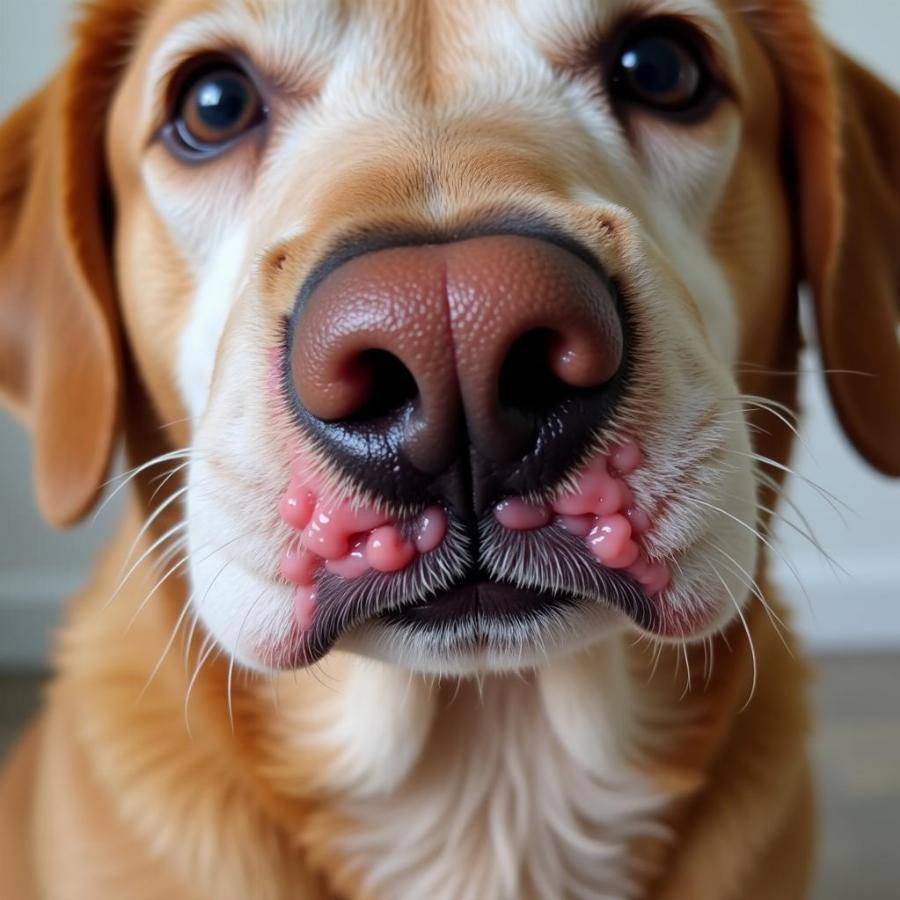Dealing with canine acne? Benzoyl peroxide for dog acne is often recommended, but what exactly is it and how does it work? This comprehensive guide dives deep into the topic, exploring everything from the causes and symptoms of dog acne to the safe and effective use of benzoyl peroxide products for your furry friend. We’ll equip you with the knowledge you need to help clear up your dog’s skin and restore their confidence.
Understanding Dog Acne: Causes and Symptoms
Just like humans, dogs can suffer from acne, typically appearing as blackheads, pimples, or pustules, most often on their chin and lips. While common in puppies going through puberty, acne can also affect dogs of any age. Some breeds, like Boxers, Dobermans, and short-coated breeds, are more prone to developing this skin condition. Understanding the underlying causes is crucial for effective treatment. These causes can range from hormonal fluctuations, allergies, bacterial infections, to poor hygiene.
Symptoms to watch for include raised bumps, redness, swelling, and sometimes even hair loss around the affected area. If your dog seems to be itching or pawing at their face excessively, it could be a sign of discomfort caused by acne.
 Symptoms of Dog Acne
Symptoms of Dog Acne
Benzoyl Peroxide: How Does it Work?
Benzoyl peroxide is a powerful antiseptic and keratolytic agent, meaning it kills bacteria and helps to break down excess keratin, a protein that can clog pores and contribute to acne formation. When applied topically, benzoyl peroxide penetrates the skin and releases oxygen, creating an environment hostile to the bacteria that thrive in acne-prone areas. This action reduces inflammation and helps to dry out the affected skin, promoting healing and preventing new breakouts.
Choosing the Right Benzoyl Peroxide Product for Your Dog
Not all benzoyl peroxide products are created equal, especially when it comes to our canine companions. It’s crucial to choose a product specifically formulated for dogs. Human-grade benzoyl peroxide products can be too harsh for their sensitive skin and potentially cause irritation. Look for products with a lower concentration of benzoyl peroxide, typically between 2.5% and 5%. Higher concentrations are usually unnecessary and can increase the risk of adverse reactions. Shampoos, gels, wipes, and sprays are all available, allowing you to choose the application method best suited to your dog’s temperament and the severity of their acne.
Using Benzoyl Peroxide Safely and Effectively
Before applying any product, always test a small area of your dog’s skin to ensure they don’t have any allergic reactions. Follow the manufacturer’s instructions carefully. Typically, you’ll need to clean the affected area with a mild cleanser before applying a thin layer of the benzoyl peroxide product. Avoid getting the product in your dog’s eyes, nose, and mouth. If your dog shows any signs of irritation, such as excessive redness, itching, or swelling, discontinue use and consult your veterinarian.
When to Consult a Veterinarian
While benzoyl peroxide is often effective in treating mild to moderate dog acne, sometimes professional veterinary care is necessary. If your dog’s acne is severe, doesn’t respond to benzoyl peroxide, or is accompanied by other symptoms like fever or lethargy, it’s essential to seek veterinary advice. Your veterinarian can determine the underlying cause of the acne and recommend the most appropriate treatment plan. They may prescribe antibiotics, topical medications, or other therapies.
Conclusion
Benzoyl peroxide can be a valuable tool in managing dog acne, helping to clear up their skin and improve their overall comfort. By understanding the causes, symptoms, and proper usage of benzoyl peroxide products, you can help your furry friend achieve a healthier, happier complexion. Always consult your veterinarian for persistent or severe cases.
FAQ
- Can I use human benzoyl peroxide on my dog? No, human benzoyl peroxide products are typically too harsh for dogs and can cause skin irritation.
- How long does it take for benzoyl peroxide to work on dog acne? It can take several weeks of consistent use to see noticeable improvement.
- What should I do if my dog licks the benzoyl peroxide? While small amounts are unlikely to cause serious harm, it’s best to prevent licking by using an Elizabethan collar or distracting your dog after application.
- Can diet affect dog acne? Yes, a balanced and nutritious diet is essential for overall skin health.
- Are there any natural remedies for dog acne? Some owners find success with natural remedies like apple cider vinegar or aloe vera, but always consult your veterinarian before trying any home remedies.
Related Articles on Beaut Dogs
For more information on dog skin health, check out these articles:
- blackheads on dogs belly
- blackheads dogs belly
- topical benzoyl peroxide for dogs
- dandruff shampoo for dogs best
Beaut Dogs: Your Trusted Source for Canine Care
Beaut Dogs is your one-stop resource for all things dog-related, offering expert advice on breed selection, care, nutrition, and training. We provide in-depth guides, product reviews, and practical tips to help you navigate the joys and challenges of dog ownership. When you need personalized guidance, don’t hesitate to reach out via Email: [email protected] for detailed and accurate answers from the Beaut Dogs experts. Visit https://beautdogs.com today to discover more!